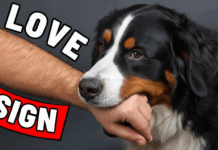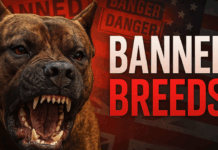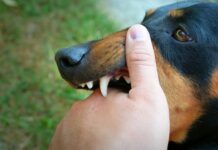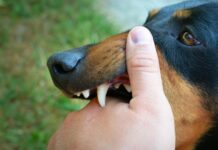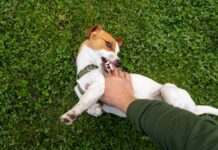Last Updated on August 13, 2024 by Dog Lover
As pet owners, we always want the best for our dogs, whether they’re awake or asleep.
One curious behavior we often notice is our dogs barking in their sleep, which might make us wonder about their dreams.
Just like humans, dogs experience dreams during their sleep, sometimes causing them to twitch, snort, or bark.
Why Do Dogs Bark While Sleeping?
Dogs usually bark in their sleep due to dreaming. You’ll notice other actions like twitching, growling, whining, or even “running” in place.
These movements happen as dogs react to the vivid stimuli in their dreams, much like they do in real life.
Dogs, like humans, go through rapid eye movement (REM) and non-REM sleep stages. However, because their sleep cycles differ, these stages are shorter.
During the REM phase of deep sleep, dogs dream, which is when you’re most likely to hear them bark. For medium-sized dogs, the first REM phase begins about 20 minutes after they fall asleep.

Understanding a Dog’s Sleep Cycle
Dogs sleep about 11–12 hours daily, with REM sleep making up nearly 3 hours of that time. Unlike humans, dogs sleep polyphasically, meaning they nap in several short periods throughout the day.
A typical dog’s sleep cycle lasts around 45 minutes, consisting of roughly 20 minutes each of non-REM and REM sleep. During non-REM periods, dogs are usually still, while REM phases can cause brief barking spells.
Breed size affects sleep cycles, with larger dogs often experiencing longer gaps (60–90 minutes) between REM phases, leading to longer dreams.
Smaller dogs may enter REM states as often as every 10 minutes, causing more frequent dreaming behaviors.

REM Sleep Behavior Disorder
While uncommon, some dogs suffer from a condition known as REM sleep behavior disorder (RBD), which can cause them to bark during sleep.
Normally, muscles relax during dream states due to temporary paralysis known as muscle atonia. However, dogs with RBD continue to move because their motor neurons keep firing, resulting in movements that mimic real-life actions.
Dogs with RBD may display abnormal and sometimes aggressive movements during REM sleep, including biting, growling, and chewing. These actions may occur during both day and night sleep periods.
Underlying conditions like tetanus or neurological diseases, or genetic predispositions, can contribute to RBD.
Unlike in humans, where RBD typically develops with age, dogs usually show signs before their first birthday. Treatment often involves antidepressants or anti-seizure medications to manage symptoms.
What Do Dogs Dream About?
While dogs can’t tell us about their dreams, it’s believed they dream about their daily experiences, much like humans.
Dogs may replay events from their day, responding in their dreams as they would in real life.
For example, hunting dogs might dream about chasing prey, while Collies might recall herding tasks. Positive and negative experiences can shape their dream responses.

Should You Wake a Barking Dog?
If your dog barks while sleeping, it’s usually best not to wake them. These vocalizations are generally harmless, and attempting to wake your dog may pose more risk.
A suddenly awakened dog can become confused and might react aggressively, potentially causing accidental harm.
Allow your dog to continue his sleep behaviors in a safe space. If the noise becomes disruptive, consider relocating his bed to a quieter area of the house.
Final Thoughts
A dog barking in his sleep is rarely a cause for concern. It’s likely a natural part of dreaming, reflecting their memories and experiences.
Unless there’s a change in your dog’s sleeping or waking behavior, this barking is just another charming aspect of having a furry friend.

